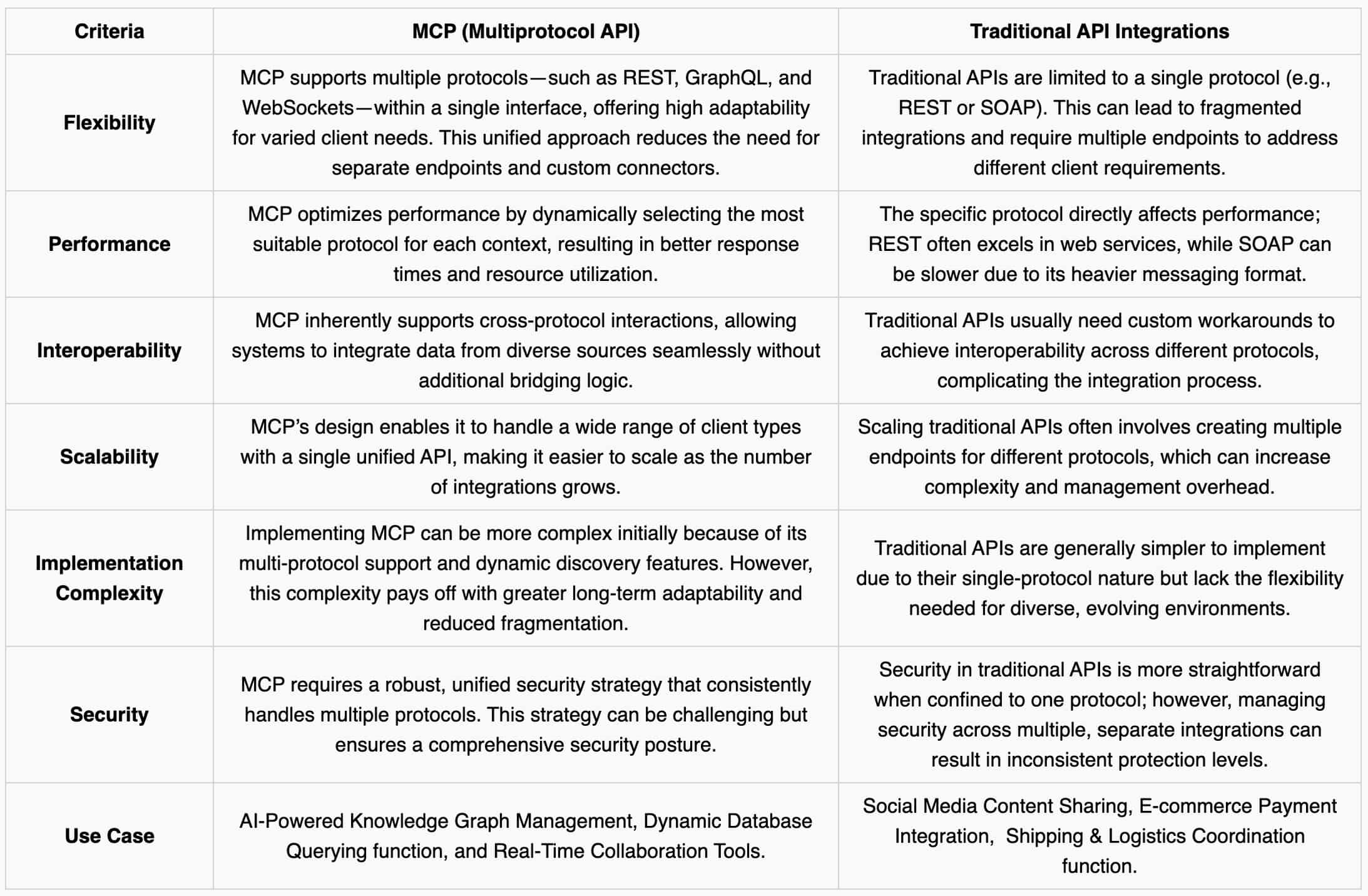By industry
By initiatives
By industry
By initiatives
AI | Mar 24, 2025 | 7 min read | By Savan Kharod

Savan Kharod works on demand generation and content at Treblle, where he focuses on SEO, content strategy, and developer-focused marketing. With a background in engineering and a passion for digital marketing, he combines technical understanding with skills in paid advertising, email marketing, and CRM workflows to drive audience growth and engagement. He actively participates in industry webinars and community sessions to stay current with marketing trends and best practices.
Traditional APIs like REST, SOAP, GraphQL, and gRPC have long been the backbone for connecting applications and data sources. However, a new approach known as MCP (Multiprotocol API), or the model context protocol, is emerging to address the growing complexity of modern integrations. As the role of AI in APIs grows, especially in contexts like MCP, it’s worth exploring some of the best AI APIs currently shaping next-gen integrations.
In this article, we compare MCP vs. traditional APIs, examining their differences, use cases, advantages, and limitations to help you determine the best strategy for your organization.
Unify API control across clouds and gateways, download How to Manage APIs in a Multi-Cloud, Multi-Gateway Environment for free.
APIs (Application Programming Interfaces) are the building blocks of modern software, enabling different systems to communicate. Traditional APIs have been the standard method for connecting applications to data sources and services. They generally follow a request-response model built around specific protocols dictating how clients and servers interact.
Common Types of Traditional APIs:
Need real-time insight into how your APIs are used and performing?
Treblle helps you monitor, debug, and optimize every API request.
Explore Treblle
Need real-time insight into how your APIs are used and performing?
Treblle helps you monitor, debug, and optimize every API request.
Explore Treblle
Understanding the differences between MCP vs. Traditional APIs is essential for choosing the right application integration strategy. Below is a detailed comparison that highlights the key distinctions and contextual insights into how each approach performs in real-world scenarios.

When evaluating integration strategies, it's crucial to understand the strengths and weaknesses of both Model Context Protocol (MCP) and traditional APIs. Below is a detailed comparison to guide your decision-making process.
By carefully considering these advantages and limitations, organizations can select the integration approach that best aligns with their technical requirements and business objectives.
Deciding between MCP vs. Traditional APIs requires careful consideration of your specific project requirements, technical constraints, and long-term goals. Here are some key factors to help you determine the best integration strategy:
You can choose an integration strategy that aligns with your business objectives and technical requirements by carefully weighing these factors. Whether you opt for the simplicity of traditional APIs or the advanced capabilities of MCP, selecting the right approach is critical to building a robust, scalable, and future-proof system.
When it comes to building and managing your API ecosystem, choosing the right integration strategy is essential. Whether you rely on traditional APIs or opt for the more flexible approach offered by MCP, your decision should be based on your business needs, technical skills, and plans for future growth. To learn more about boosting productivity and efficiency, read about the benefits of using AI in your API workflows.
For teams looking to simplify API governance, streamline documentation, enhance security, and gain clear insights into API performance, tools like Treblle can make all the difference. Treblle is an API intelligence platform offering robust governance, auto-documentation, real-time analytics, security, and more.
Integrating Treblle into your workflow ensures that your APIs remain reliable and scalable, allowing you to focus on what matters most: delivering enterprise-grade applications in today's competitive digital landscape.
Need real-time insight into how your APIs are used and performing?
Treblle helps you monitor, debug, and optimize every API request.
Explore Treblle
Need real-time insight into how your APIs are used and performing?
Treblle helps you monitor, debug, and optimize every API request.
Explore Treblle
 AI
AIReducing Time to First Integration is more than speed; it’s a key metric. In this post, discover 6 proven methods, backed by AI and observability, to simplify onboarding, cut friction, and lower integration time without sacrificing reliability.
 AI
AIModern APIs are powerful but difficult to integrate. Poor documentation, fragile code, and tool sprawl slow teams down. This article explores how AI is transforming API integration—automating onboarding, testing, and governance to boost speed, reliability, and scale.
 AI
AILLMs are calling your APIs, but they don’t always follow the rules. From subtle JSON mismatches to silent data pollution, probabilistic outputs can quietly break your backend. Here’s why contracts matter, and how to enforce them in real time.